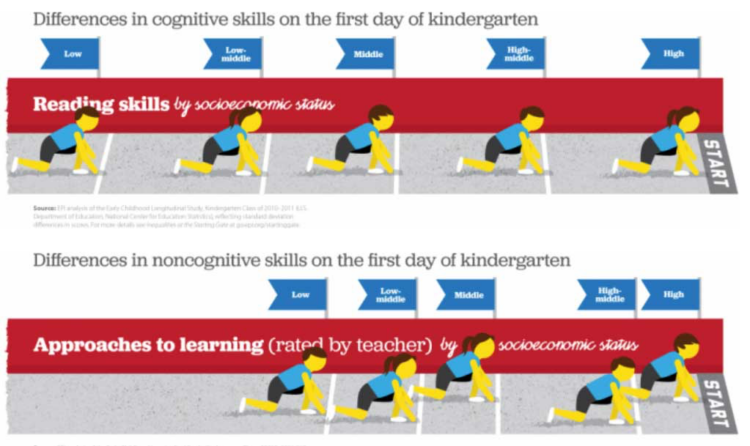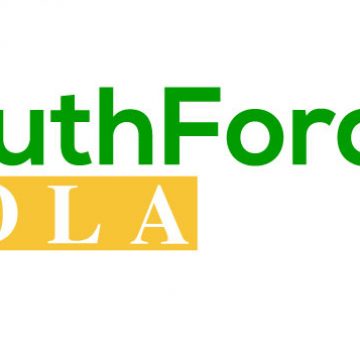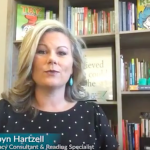Marnie and Kalvin are entering kindergarten as brand-new students. To the untrained eye, these kids seem to both be ready to transition into the classroom environment. They both recognize the letters of the alphabet in their native language, English, and each of them can also count at least up to twenty. They play well with each other, too, having grown up in the same neighborhood.
Though both kids are in school, the critical question is — are they school-ready?
Their kindergarten teacher quickly notices Marnie begin to struggle with essential aspects of being in a classroom setting. Kalvin easily makes new friends and shares classroom supplies with them, while Marnie frequently refuses to do so. Kalvin clearly tells his teacher he is feeling down or needs help with a task. Marnie struggles to verbalize her emotions and uses her body instead to express frustration or anger by hitting furniture.
This story of Kalvin and Marnie may be a familiar one to many early childhood educators, who know that both children’s future learning journey depends on the answer to this question. And at the moment, Marnie’s future looks a little less certain.
This is why high-quality early childhood education and development services are essential. By providing the right support and resources to families before that first day in the classroom, educators set up the family and their children for success, which in turn sets the tone for the rest of the learning journey after kindergarten. It’s not uncommon to hear advocates for school readiness initiatives emphasize the need to bring research-based strategies for early learning to community organizations, preschools, daycares, and other service providers.
And yet — as important as the services themselves are the educators providing them. In fact, they are the key factor in cultivating school readiness in little learners, whether they are preschool instructors or home visitors. It is just as essential for programs to emphasize high-quality educator knowledge and skills. When administrators and programs at all levels invest in their educators, they set the stage for every child to transition well into the classroom and lay the foundation for their future success.
Now more than ever, to improve school readiness in children, early childhood educators need effective coaching and professional development strategies.
The State of School Readiness Today
Before diving into the impact of professional development on school readiness, let’s first understand what it means for a child to be ready for school, why it matters, and what school readiness looks like today.
What is school readiness?
There isn’t one precise definition of “school readiness”, but in general, the concept refers to a student’s preparedness for learning in a formal classroom and school setting, usually beginning in kindergarten. To be ready for school-based learning, kids need to develop a range of pre-academic skills (e.g. basic counting with numbers, letter recognition), social skills (e.g. playing and sharing with peers), motor skills (e.g. holding and using scissors correctly), and cognitive skills (e.g. follow directions). All of these school readiness skills set a child up for successfully transitioning from learning in a daycare or home environment to the formal classroom setting that they’ll experience for most of their school journey.
Why is school readiness important?
Research has shown that when little learners are “school ready”, they are more likely to experience positive learning outcomes during their school experiences, including higher academic achievement, an increased likelihood of graduating from high school, improved cognitive development, and much more.
In contrast, a lack of school readiness in kindergarteners can negatively impact their learning as well as cost schools and districts more to support these kids over time. In one study with Baltimore City Schools, researchers found that 5-year-old students identified as not socially and behaviorally ready for school were more likely than their “ready” peers to be retained in one grade, require additional services like IEPs, or be suspended by the time they reached fourth grade (Bettencourt et al., 2017).
These patterns underscore the need for educators to improve school readiness in the youngest learners through quality early childhood education and readiness programs
What does school readiness in children look like today? The Impact of COVID-19 on School Readiness
School readiness isn’t a new challenge for educators, nor are the various forms of inequity that affect students preparing to enter kindergarten, particularly inequities of income and access to resources. Even before the COVID-19 pandemic shut the doors for preschools and early childhood programs across the world, research showed that disparities in family socioeconomic status contributed most heavily to a student’s school readiness. When families cannot access the resources they need, students are less prepared for learning in a classroom — even as early as two years old.

The impact of COVID on school readiness can only be described as devastating. One research study found that motor and cognitive skill development was significantly worse in the 2029-2020 school year than the three years prior — with learning loss less pronounced in high socioeconomic preschool communities, further widening this existing gap in access (Gonzalez et al., 2022). Things did not improve when schools returned to in-person learning in 2021. Nearly 80% of preschool teachers surveyed in another study reported that PreK and kindergarten students functioned “worse” or “much worse” than prior to the pandemic, as measured against the Head Start school readiness framework (Murphy, Giordano & Deloach, 2023).
In the wake of the worst parts of the pandemic, educators must now find solutions to these downward trends in school readiness among children. It has become all the more crucial for educators to improve these skills in all children toward this goal.
However, there are emergent silver linings that bring hope for early childhood educators. According to the National Institute for Early Education Research (NIEER), state-funded preschool programs saw their enrollment rates return to pre-pandemic levels in 2022, even after these rates fell by nearly 20% just two years prior. With more kids enrolling in early childhood programs comes more opportunities for early childhood educators to reverse these negative trends in school readiness.
How Early Childhood Educators Improve School Readiness Skills
Educators may not have direct control over factors affecting a family’s socioeconomic status, but they do have a number of levers available to positively nurture school readiness in all children, regardless of their background.
In their 2021 analysis, the Education Commission of the States found that there are two buckets of malleable factors that most heavily impact a child’s school readiness:
- Educational factors, which emphasize increasing the quality of a preK program, providing targeted support for English Language Learners (ELLs), and offering early intervention services (EI) to support infants and toddlers with developmental delays.
- Health factors, which focus on screening for a student’s physical development (examining fine and gross motor skills), helping families to create systems of support to build resilience against trauma and adverse childhood experiences (ACEs), leveraging social-emotional learning for families and children’s mental health alike, and creating systems of support within a program that nurture educators’ wellbeing.
A school readiness program can utilize a combination of these factors to cultivate school readiness skills in children, as well as prepare families for supporting their children in a new school-based environment. For example, since 2014, Oregon has coordinated both at-home early intervention services from health providers and early learning organizations for their families. By combining funding streams and policy development efforts, educators across the state can maximize kids’ school preparedness.
To positively influence school readiness across any of these factors, early childhood educators need the right support and resources that enable their success. This is where professional development and growth strategies come into play.
The Power of PD in Improving School Readiness
High-quality early childhood services are essential for building school readiness in children. Professional development, coaching, and collaboration provide the backbone of ongoing adult learning and improvement that increases the quality of such services.
As qualifications and skill requirements have increased in the early childhood education profession, the need in turn for high-quality coaching and professional training has increased. Strategies like individual practice-based coaching can support preschool educators within a program with improved child learning outcomes and school preparedness. Vario forms of early intervention training also offer benefits to early childhood programs by bringing the latest research and insights to service providers to inform their work with families in the field.
But offering professional development within a single program isn’t the only pathway towards more equitable school readiness in children. In fact, the greatest opportunity lies in improving staff skills and knowledge at all three levels such that educators are empowered with best practices, mentorship, and resources that allow them to serve their families best.
3 Considerations for Educators to Address School Readiness Through PD
TORSH has worked with hundreds of early childhood education organizations to modernize and uplevel their professional development and coaching strategies. And we know the power that the right professional training and mentorship can provide to teachers. We offer these considerations for early childhood education organizations at local, programmatic, and regional/state levels for how they can ensure professional training and coaching leads to more kids being school-ready.
Teachers: Cultivate Collaboration Opportunities
Research studies have long indicated the power of teacher collaboration to improve student academic outcomes, teacher retention, and overall school climate in elementary and secondary schools. Educator collaboration also confers benefits in the early childhood education space.
When teachers partner together to address student challenges, develop instructional strategies, or simply share empathy with one another, they are better positioned to find creative ways to nurture students’ individual development needs. Teacher-coach collaborations also bring boons to early childhood programs, as coaching can individualize training and feedback to meet that teacher’s professional goals, as well as specific opportunities for improving their skill sets — all of which support kids’ learning in the end.
Whether collaboration occurs through informal settings like professional learning communities or a formal 1:1 mentorship, TORSH Talent has the tools to empower educators and professional development providers to work together. Learn more about features like in-video comments, resource libraries, and more.
Programs: Centralize Coaching Resources and Practices
One of the few positive outcomes from peak COVID times was the increased use of digital tools to support in-person, remote, and hybrid coaching and professional learning in education. Administrators at the program level have ample opportunity to centralize and streamline these practices in service of their early childhood support staff.
For instance, on the TORSH Talent platform, a program team can develop coaching rubrics and guidelines for coaches to access and use in their relationships with teachers. Standardizing tools for coaching also makes it easier to measure what impact coaching practices might be having individually on each teacher’s growth, as well as collectively across child growth and development goals.
Early childhood programs can also curate exemplary videos of teaching practices or learning activities for their teams to access from one centralized resource library on TORSH Talent. If programs belong to a larger regional or state group, their teams can also share these practices with one another, further broadening the pool of expertise available to early childhood educators.
States: Focus On High-Quality, Accessible Early Intervention Services
At the highest level of implementation, state and regional organizations are best positioned to influence the factors that underpin children’s school readiness early and systemically. They can act as a centralized hub when using platforms like TORSH Talent, from which they distribute resources like training videos, exemplary instructional practices, coaching rubrics, and other materials across many local programs in one sweep.
States and regional programs also often have the funding to deploy services more widely across families than a local program might be able to manage. Home visits in early intervention services are an especially powerful way for state and regional programs to make a positive difference in the lives of children and their families. Again, by investing in high-quality early intervention training for home visit staff, they ensure families and children get the quality support they need to be school-ready by kindergarten.
TORSH Talent has worked with multiple state and regional early intervention programs to streamline their PD approaches, helping coaches and staff alike improve the quality of services provided to families to support early learning at home. Learn more about our recent success stories.
Cultivate School Readiness Best Practices with TORSH
TORSH Talent offers the most comprehensive platform to support early childhood educators and staff service families of young children at all programmatic levels, from a local preschool to statewide Head Start programs.
Partners like the Georgia Department of Early Care and Learning (DECAL), Acelero Learning, and the Consolidated School District of New Britain take full advantage of the easy-to-use and secure tools built into TORSH Talent, including tools for:
- Video-based observation
- Providing targeted, specific feedback to teachers on their interactions with children and families
- Synchronous and asynchronous collaboration
- Individualized coaching
- Insights to guide professional learning and training
Streamline and simplify your early childhood educator professional development needs with TORSH Talent, from early intervention training to practice-based coaching. Request a demo today!




